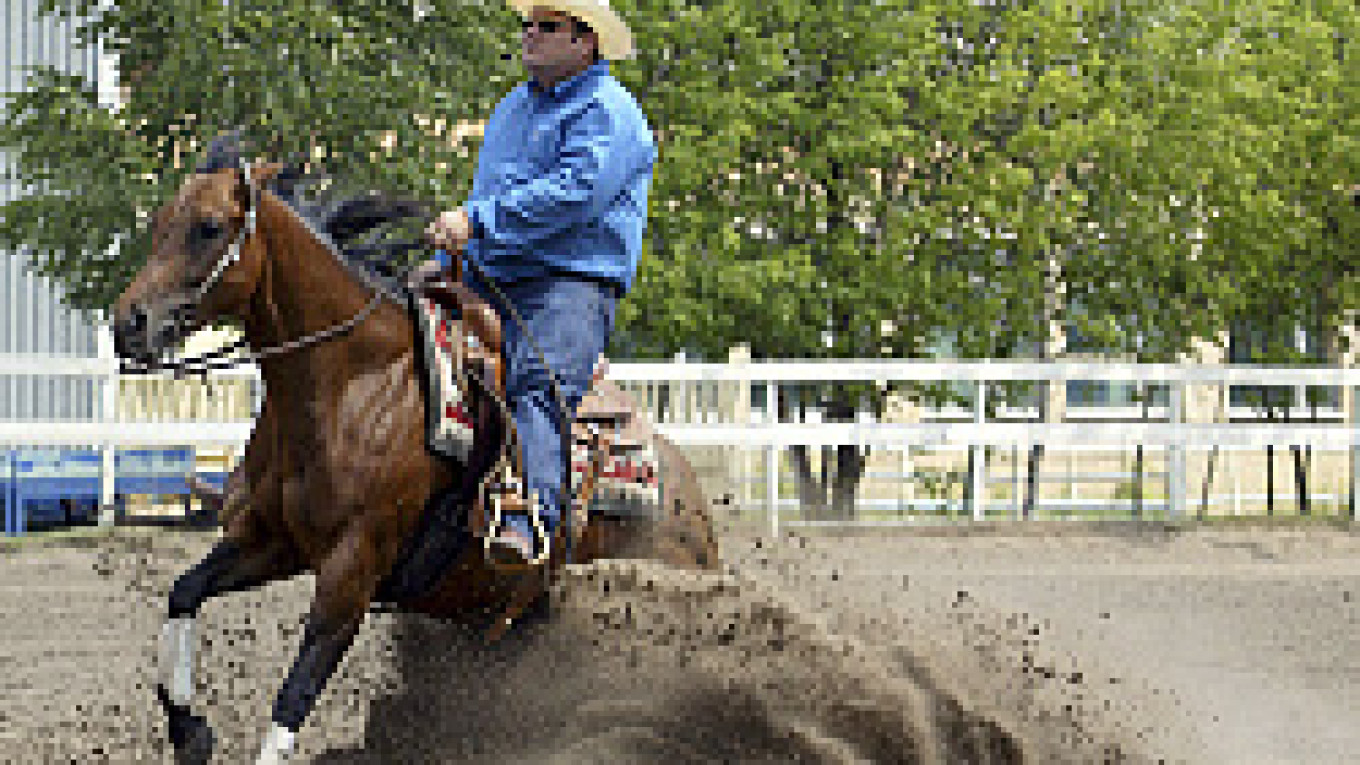Their clothing was strange enough, but the riding they displayed, called "reining," was a revelation to the 150 locals who watched the exhibition at the Sokolniki Park arena this week.
As reiner Dell Hendricks of Tioga, Texas, galloped toward the stands at full speed and made his horse slide to a complete stop with just a well-timed "Whoa!" the audience gasped and whistled and -- after some coaxing from the Americans -- even cheered. "No one has ever seen such a thing in Russia," said Anastasia Yerlova, a horse enthusiast. "People ... couldn't imagine what this looks like and how it's possible."
Michael Phillips of Salem, Illinois -- whose handlebar mustache and pocketwatch made him stand out from the other cowboys -- described reining as "power steering on a horse."
With softly spoken words and easy squeezes of the reins, riders made their horses spin in place, switch their lead leg while riding a figure-eight, and perform reining's trademark "sliding stop."
Russian horse experts said it was different from anything they were used to.
"The European system doesn't give the horse any freedom, the rider dictates everything," said Svetlana Zinovieva, a veterinarian. "Here, instead, you have freedom, the horse has to want it itself."
Reining stems from pioneer days, when cowboys had to maneuver their horses around cattle while handling a lasso at the same time.
Now, professional reiners want to extend the sport's reach to the Olympics. Marc Wagman of Tulsa, Oklahoma, wants reining to become part of the 2012 Games. To succeed, reiners need to expand their event's "universality," he said.
"If we could get the biggest Eastern- bloc country to enjoy the sport, it would really aid our push for the Olympics," Wagman said.
Reining's relationship with Russia began last year, when a group of Russian horsemen visited a reining show in Tulsa, Oklahoma. "They really enjoyed it so much that they invited us to come here this year," Wagman said.
A member of that Russian delegation was Alexander Timchenko, 71, the director of an equestrian association here. Timchenko, sporting his own cowboy belt and hat, said he could envision a day when reining will have taken hold in Russia. "In 25, 30 years, everything will be wonderful," he said. "It's too bad I won't be alive in that wonderful time."
The Americans also appeared struck by their visit. Many said that for all the cultural differences between the two countries, some things were almost the same. Two smiling young women, in identical gold dresses, distributed vodka. As he held a shot, Wagman said it wasn't too different from Oklahoma horse competitions: "They have instead of the vodka girls, the Coors Light girls."
Sokolniki Park was the scene of another cultural collison a half-century ago: the 1959 American products exhibition, where Soviet leader Nikita Khrushchev and U.S. Vice President Richard Nixon had an impromptu exchange that became known as the kitchen debate.
This time, though, the biggest culture shock came as the Americans tried to convince the Russians to cheer. When Hendricks bellowed, "Are you ready?" through his wireless microphone (and a translator), the crowd didn't realize they had to make noise. Later, a spectator asked Hendricks' translator to tell him that in Russia, it was impolite to cheer while a horse was performing. "Of course they can't get us to clap," Yerlova said. "You know, we're rarely a very noisy people when we're sober."
A Message from The Moscow Times:
Dear readers,
We are facing unprecedented challenges. Russia's Prosecutor General's Office has designated The Moscow Times as an "undesirable" organization, criminalizing our work and putting our staff at risk of prosecution. This follows our earlier unjust labeling as a "foreign agent."
These actions are direct attempts to silence independent journalism in Russia. The authorities claim our work "discredits the decisions of the Russian leadership." We see things differently: we strive to provide accurate, unbiased reporting on Russia.
We, the journalists of The Moscow Times, refuse to be silenced. But to continue our work, we need your help.
Your support, no matter how small, makes a world of difference. If you can, please support us monthly starting from just $2. It's quick to set up, and every contribution makes a significant impact.
By supporting The Moscow Times, you're defending open, independent journalism in the face of repression. Thank you for standing with us.
Remind me later.


